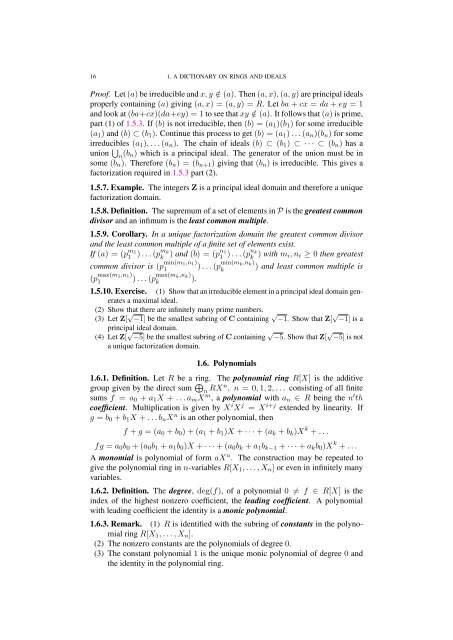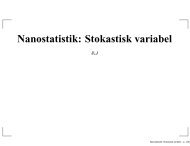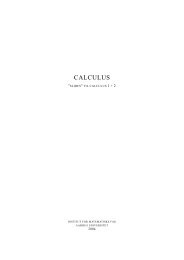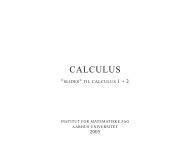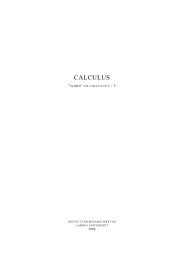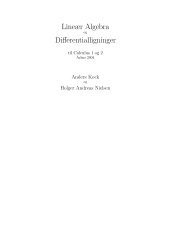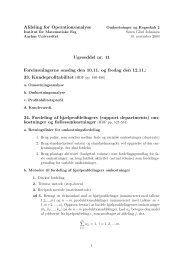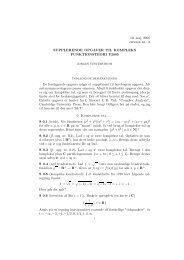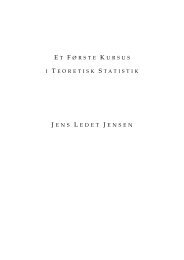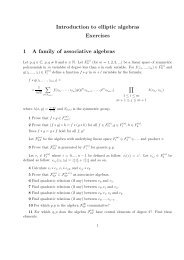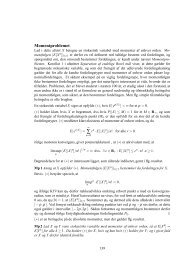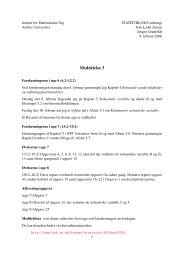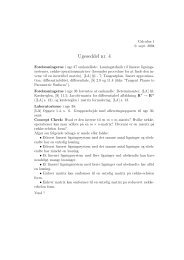Commutative algebra - Department of Mathematical Sciences - old ...
Commutative algebra - Department of Mathematical Sciences - old ...
Commutative algebra - Department of Mathematical Sciences - old ...
Create successful ePaper yourself
Turn your PDF publications into a flip-book with our unique Google optimized e-Paper software.
16 1. A DICTIONARY ON RINGS AND IDEALS<br />
Pro<strong>of</strong>. Let (a) be irreducible and x, y /∈ (a). Then (a, x), (a, y) are principal ideals<br />
properly containing (a) giving (a, x) = (a, y) = R. Let ba + cx = da + ey = 1<br />
and look at (ba+cx)(da+ey) = 1 to see that xy /∈ (a). It follows that (a) is prime,<br />
part (1) <strong>of</strong> 1.5.3. If (b) is not irreducible, then (b) = (a1)(b1) for some irreducible<br />
(a1) and (b) ⊂ (b1). Continue this process to get (b) = (a1) . . . (an)(bn) for some<br />
irreducibles (a1), . . . (an). The chain <strong>of</strong> ideals (b) ⊂ (b1) ⊂ · · · ⊂ (bn) has a<br />
union <br />
n (bn) which is a principal ideal. The generator <strong>of</strong> the union must be in<br />
some (bn). Therefore (bn) = (bn+1) giving that (bn) is irreducible. This gives a<br />
factorization required in 1.5.3 part (2).<br />
1.5.7. Example. The integers Z is a principal ideal domain and therefore a unique<br />
factorization domain.<br />
1.5.8. Definition. The supremum <strong>of</strong> a set <strong>of</strong> elements in P is the greatest common<br />
divisor and an infimum is the least common multiple.<br />
1.5.9. Corollary. In a unique factorization domain the greatest common divisor<br />
and the least common multiple <strong>of</strong> a finite set <strong>of</strong> elements exist.<br />
If (a) = (p m1<br />
1 ) . . . (pmk k ) and (b) = (pn1 1 ) . . . (pnk k ) with mi, ni ≥ 0 then greatest<br />
common divisor is (p min(m1,n1)<br />
1 ) . . . (p min(mk,nk)<br />
k ) and least common multiple is<br />
).<br />
(p max(m1,n1)<br />
1<br />
) . . . (p max(mk,nk)<br />
k<br />
1.5.10. Exercise. (1) Show that an irreducible element in a principal ideal domain generates<br />
a maximal ideal.<br />
(2) Show that there are infinitely many prime numbers.<br />
(3) Let Z[ √ −1] be the smallest subring <strong>of</strong> C containing √ −1. Show that Z[ √ −1] is a<br />
principal ideal domain.<br />
(4) Let Z[ √ −5] be the smallest subring <strong>of</strong> C containing √ −5. Show that Z[ √ −5] is not<br />
a unique factorization domain.<br />
1.6. Polynomials<br />
1.6.1. Definition. Let R be a ring. The polynomial ring R[X] is the additive<br />
group given by the direct sum <br />
n RXn , n = 0, 1, 2, . . . consisting <strong>of</strong> all finite<br />
sums f = a0 + a1X + . . . amX m , a polynomial with an ∈ R being the n ′ th<br />
coefficient. Multiplication is given by XiX j = Xi+j extended by linearity. If<br />
g = b0 + b1X + . . . bnX n is an other polynomial, then<br />
f + g = (a0 + b0) + (a1 + b1)X + · · · + (ak + bk)X k + . . .<br />
fg = a0b0 + (a0b1 + a1b0)X + · · · + (a0bk + a1bk−1 + · · · + akb0)X k + . . .<br />
A monomial is polynomial <strong>of</strong> form aX n . The construction may be repeated to<br />
give the polynomial ring in n-variables R[X1, . . . , Xn] or even in infinitely many<br />
variables.<br />
1.6.2. Definition. The degree, deg(f), <strong>of</strong> a polynomial 0 = f ∈ R[X] is the<br />
index <strong>of</strong> the highest nonzero coefficient, the leading coefficient. A polynomial<br />
with leading coefficient the identity is a monic polynomial.<br />
1.6.3. Remark. (1) R is identified with the subring <strong>of</strong> constants in the polynomial<br />
ring R[X1, . . . , Xn].<br />
(2) The nonzero constants are the polynomials <strong>of</strong> degree 0.<br />
(3) The constant polynomial 1 is the unique monic polynomial <strong>of</strong> degree 0 and<br />
the identity in the polynomial ring.


